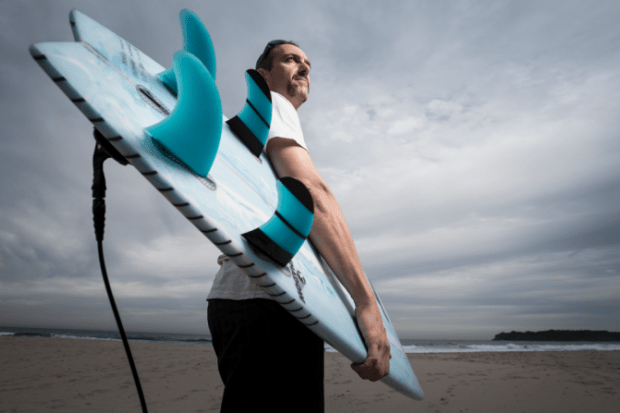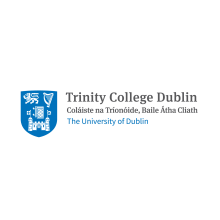Marc in het Panhuis has been the University of Wollongong’s inaugural dean of sport since February. He oversees Wollongong’s sport and exercise-related activities and acts as “ambassador” for its sporting partnerships. During a 17-year stint at the university, Professor in het Panhuis has been the driving force behind the Surf Flex Lab, a research laboratory that navigates the boundary between sport and science. It began as an exploration of whether 3D-printed fins could enhance the surf experience.
Where and when were you born?
May 1970 in a village called Grevenbicht, in the narrowest part of the Netherlands between Belgium and Germany. Belgium is 200m away and Germany 3km away.
How has this shaped who you are?
My parents always said that you can work or you can study – you can’t sit around doing nothing. My parents didn’t have a lot of opportunity in education. Most locals worked in factories in Germany or in the coal mines. I come from a mining family. As a kid I was always fascinated that everybody I knew – my dad, uncles, grandpa – had black scars everywhere. I’m the first in my family to go to uni.
What did you study?
I trained as a chemical engineer, finishing my degree by working on tertiary oil recovery at Shell Research in Amsterdam. Then I moved to Ireland to do a PhD in physics, working on the behaviour of gases in liquids. CO2 gases versus nitrogen gases; the difference between the head of a Guinness and a lager. In the 2000s I got into what is now called additive manufacturing: the building up of materials.
How did somebody who grew up landlocked in the Netherlands become a surfer?
When I was growing up, I had severe asthma and one of the treatments at the time was to expose your child to the ocean. We used to go to the North Sea at every opportunity. Fast forward quite a few years and I was living in the northernmost part of the Republic of Ireland. My wife was always surfing and I did a bit of ocean swimming. When we came to Australia 20 years ago, I bought her a surfboard for her birthday and thought I might as well give it a go. I became addicted to surfing and president of the local board-riders club.
How did surfing make the jump from leisure to the lab?
I was working on 3D printing. The event horizon for translating that work out of the lab is about 10 years – you have to do trials and all sorts of things. I was always thinking “how can I do research where the translation time between laboratory and the real world is really short?” When a friend asked whether we could use our fancy 3D printers to make fins for surfboards, that kicked off this whole idea of looking at surfing as a science. In the past few years, that’s pretty much all I’ve worked on. I have a lab where we design our own instruments to quantify the mechanical behaviour of surfboards and fins. We also look at the performance analysis of surf – measuring what surfers feel – because surfing is a very subjective sport. We’ve come up with sensors that we put on boards to quantify the subjective experience. We’re now building a CNC [computerised numerical control] machine from scratch so we can start making surfboards at the university for research purposes. I’ve completely ruined my hobby.
What’s a dean of sport?
It’s probably the coolest title I’ve had. I’m still in the phase that people call “drinking from the firehose” – talking to as many people as I can. We’re going to come up with an institutional approach to all matters sport. Eventually there will be an overarching university entity. We haven’t settled on the name yet. It will bring everything together – academic programmes, research programmes, our global campuses [Hong Kong, Kuala Lumpur and Dubai], our elite athlete programmes.
Why sport?
We’ve recognised that we have a lot of unique capabilities in sport within the university. We have a fully student-run motorsport team, which came second in Australia last year in the electric vehicle category. At the elite level, the university has programmes with the Illawarra Hawks [basketball], St George Illawarra Dragons [rugby league] and the Crusaders [New Zealand rugby union team], and a partnership with Tottenham Hotspur Football Club in the UK.
Why now?
Covid has changed so many things. It’s not uncommon for people to base themselves hundreds of kilometres from their place of work, and they miss the interaction. We’ve seen this in our students as well – the difference between last year, when they were coming out of Covid, versus this year, when they’ve had more normality. You can really tell that people like interactions with other people, and sport is a great way to make that happen. It’s a great icebreaker and a unique vehicle that you can use to help people. Something we want to address is mental health. Every time you step in the ocean – you don’t have to be on a surfboard – you take your shoes off and ground yourself. It’s really good for being in the moment. I have this thing that if I go to the beach, I just go in. Even in the worst weather, I just go in.
What do you like most about academia?
The flexibility. I’ve been able to change my research direction quite drastically, from 3D printing of soft gels to working on hard surfing materials. And I really enjoy interacting with young and not-so-young people – working with all that enthusiasm is really nice.
What do you like least?
The constant draining process of applying for money and being rejected. Grant application success rates are about 10 or 15 per cent, so you’re more likely to fail than succeed. You’ve got to grow a thick hide. People see the success stories, the papers published, the grant money, but they don’t see the frustration that lies behind it. I see it from both sides because I’m a journal editor, handling about 300 papers a year for a UK publisher. I’m not in the business of accepting papers. I’m in the business of rejecting papers. I sometimes get emails in capital letters, if you know what I mean.
If you were universities minister for a day, what would you do?
In an ideal world, I would change tuition fees to administration fees and have the government fund teaching and learning, as in the German or Dutch model. This is what enabled me to attend university. The costs would have been prohibitive otherwise.
john.ross@timeshighereducation.com
CV
1989-95 Chemical engineering degree, University of Twente
1994-95 Junior researcher, Shell, Amsterdam
1995-98 PhD in physics, Trinity College Dublin
1998-2000 Postdoc in physical chemistry, University of Manchester
2001 Principal scientist, Media Lab Europe, Dublin
2001-03 Research consultant, Donegal
2003-04 Assistant professor, The University of Texas at Dallas
2004-06 Lecturer in physical chemistry, University of Hull
Since 2006 Future fellow/professor/associate dean/executive dean/dean, University of Wollongong
Appointments
Insead business school has announced the appointment of Francisco Veloso as its new dean. Professor Veloso will join from Imperial College Business School in London, where he has been working as dean since 2017. Born in Portugal, he was the dean at Católica Lisbon School of Business & Economics in his homeland and will officially take up his new position at Insead – an international business school with locations in France, Singapore, Abu Dhabi and San Francisco – in September.
Stacey Abrams will join the faculty of Howard University in Washington, DC, after her defeat to Republican Brian Kemp in her second attempt at becoming the governor of Georgia last year. Howard is one of the US’ top historically black colleges and Ms Abrams will join as the Ronald W. Walters endowed chair for race and black politics. According to the university, she will not carry out traditional full-time faculty duties but will lecture, invite guest speakers and host symposia. She will begin the role in September.
Rahul Nair has been appointed the Royal Academy of Engineering research chair in advanced membranes for sustainable separation technology. Professor Nair is one of just seven UK researchers awarded the five-year position, which is aimed at promoting collaboration between academia and business to solve engineering challenges.
Grant Wheeler has been announced as Heriot-Watt University’s new head of commercialisation. He has previously spent more than two decades working in enterprise creation and technology commercialisation in a range of roles in the UK. Mr Wheeler said he found the “breadth and quality of applied research” coming out of the Scottish university “hugely exciting”.
The University of Education, Winneba, in Ghana has appointed Victor Antwi as its new pro vice-chancellor. Prior to his appointment, he was one of four convocation representatives on the university’s governing council.
Register to continue
Why register?
- Registration is free and only takes a moment
- Once registered, you can read 3 articles a month
- Sign up for our newsletter
Subscribe
Or subscribe for unlimited access to:
- Unlimited access to news, views, insights & reviews
- Digital editions
- Digital access to THE’s university and college rankings analysis
Already registered or a current subscriber? Login










